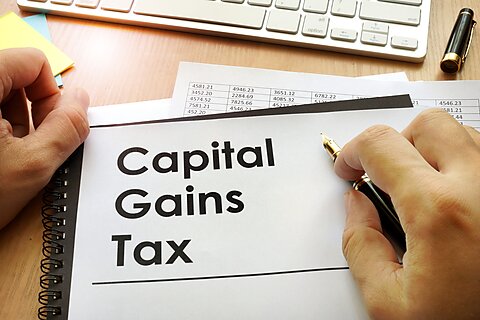The Washington Post recently reported that outside groups and Republican lawmakers are urging President Trump to unilaterally cut taxes on capital gains by indexing them to inflation. There are important legal and procedural questions on whether Trump has the authority to take such a step, but behind the legal fight lies a real economic distortion that should not be overlooked.
Because capital gains are taxed on nominal returns, investors often pay taxes not just on the real (inflation-adjusted) gains but also on inflation. The result is an effective tax rate that can far exceed the statutory 23.8 percent rate. In some cases, the effective capital gains rate can exceed 100 percent, sometimes resulting in an infinite effective tax rate. The following analysis shows how inflation silently inflates the tax burden on investment and why it strengthens the case for reforming or repealing the capital gains tax.
What Is the Capital Gains Tax?
When an investor sells an asset like a stock for more than they paid to acquire it, they realize a capital gain. That gain is subject to the federal income tax. For assets held for less than a year, capital gains are taxed as ordinary income up to a rate of 37 percent. For assets held for a year or more, the top capital gains rate is 20 percent, plus an additional 3.8 percent Net Investment Income Tax (NIIT), for a total top rate of 23.8 percent.
For example, suppose an investor bought an average S&P 500 stock for $100 in 2004 and sold it for $170 ten years later, in 2014, after the stock market recovered from the financial crisis. The $70 nominal gain is taxed at 23.8 percent, resulting in a $17 tax bill on the realized gain. After adjusting for inflation, the real gain was just $46. The investor effectively paid a 35.8 percent tax on their real return (the effective tax rate here is taxes paid divided by the real gain).
The capital gains tax is also a second layer of tax on corporate equities, levied after business profits are taxed by the 21 percent corporate income tax. These two layers of tax are in addition to any wage taxes paid on the seed capital. These multiple layers of tax create the income tax’s higher effective tax rates on saving and investment and, in turn, reduce investment, entrepreneurship, and economic growth.
Effective Tax Rates Vary Widely with Inflation
Inflation can erode nominal investment returns and push the effective rate on real returns far above the statutory rate, although this effect can be attenuated over longer periods of time.
Figure 1 shows the S&P 500 Index in nominal terms and adjusted for inflation in 2024 dollars using the CPI‑U.
Because the capital gains tax is assessed on nominal price appreciation, it can apply mostly or entirely to inflationary gains during periods of high inflation and low real growth.
Figure 2 shows just how much timing and inflation can matter. The top panel estimates the effective capital gains tax rate for an average S&P 500 stock purchased in every year between 1957 and 2023 and sold in 2024. The effective rate is consistently higher than the statutory rate, averaging 28 percent across all years.
The second panel examines ten-year holding periods and stocks bought in a given year and sold a decade later. This scenario makes the inflation effect even clearer. In eight years, the real return was negative, yet the IRS still taxed the nominal gain, leading to an infinite effective tax rate.
Table 1 drills deeper by comparing effective tax rates on the S&P 500 with hypothetical investments facing historical inflation rates but earning lower average annual returns of 3 percent, 5 percent, 7 percent, and 9 percent, and held until 2024. These examples show how slower-growing investments are more vulnerable to inflation-driven tax distortions. Even modest inflation can wipe out real returns, especially for low-yield investments, and still trigger a capital gains tax liability. When the effective tax rate on realized gains exceeds 100 percent, the investor pays more in tax than they made in real gains.
Using a different method, Kyle Pomerleau illustrates how inflation can raise effective tax rates on different asset types and holding periods. Incorporating the effects of delayed realization, the inflation penalty on other investments, such as bonds and dividends, can be even higher than on capital gains.
Should the Capital Gains Tax Account for Inflation?
Two of the income tax’s core flaws are that it first levies higher taxes on investments by taxing both the seed capital and the investment returns, often multiple times, and second, without complex adjustments, it conflates inflation with real income growth.
The best fix for the income tax is to repeal and replace it with a consumption-based tax that doesn’t penalize saving or investments or conflate inflation with income. A more modest reform would repeal the capital gains tax or simply lower the tax rate to reduce its economic distortions. There are also several existing inflation protections in the tax code, including tax-advantaged savings accounts, such as 401(k)s and IRAs, the capital gains exclusion on principal residences, and stepped-up basis at death. Trump recently entertained expanding the capital gains tax exclusion on home sales.
Short of repealing the capital gains tax, it could also be indexed for inflation. Indexing is a more precise adjustment for the inflation problem, though it is more complex to administer. Indexing the asset’s tax basis (purchase price) would be a meaningful reform to correct one of the income tax’s economically costly distortions. If indexing is pursued, it should be done comprehensively. Other parts of the tax code are also affected by inflation (often more so than capital gains), such as interest income, interest expense, depreciation deductions, and net operating losses. Indexing only capital gains may create new arbitrage opportunities and other compliance challenges.
Taxing investors on fictitious gains, often caused by poorly conceived government policies, is not just bad economics; it is deeply unfair. No one should owe taxes on money they never actually made. But thanks to our broken tax code, that’s exactly what the IRS demands.
















